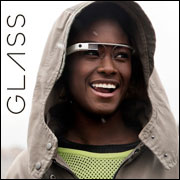
Google on Tuesday released XE 12, the latest update to its Google Glass product. One of its new features lets users take a photo with a wink, something that previously could be done by using a third-party app.

“If I were Google, I’d keep quiet about … how quickly people can take photos of unsuspecting targets,” Joshua Flood, an analyst at ABI Research, told TechNewsWorld.
Privacy is the biggest issue on the Internet, he said.
Other new XE 12 features let users listen to music on their Google Music playlists, use Hangouts to share chats and photos and make video calls, and post videos to YouTube.
XE 12 also has a screen lock that will activate when users deactivate Google Glass or take Glass off.
The Eyes Have It
Wink is an exploratory feature, Google said. It will be available only on units purchased or swapped after Oct. 28.
The feature is faster than using voice commands or the camera button on Glass, Google said. It works even when the Glass display is off.
Google is seeking comment from Explorers — those intrepid souls who shelled out US$1,500 for the experimental version of Google Glass.
How Wink May Work
How might Google Glass distinguish a wink from a blink?
A camera in the Google Glass lens might be used to pick up a wink, ABI’s Flood suggested. If so, speed would be the key factor.
“If your eye closes and opens faster than a certain speed, the camera would register it as a natural blink,” he said, “and I think you’d have to use an exaggerated wink to make the Wink feature work.”
Every Move You Make
Reaction to Google Glass among non-users has been less than friendly. Users have been accosted by angry strangers who felt their privacy was being violated.
The 5 Point Caf in Seattle banned people wearing the device even before it was released, and another restaurant owned by the same entrepreneur, the Lost Lake Caf & Lounge, evicted a customer for refusing to take off his Google Glass while on the premises.
Stop The Cyborgs offers signs banning Google Glass for download.
In a move likely to further rile privacy advocates, third-party developer Lambda Labs plans to release a facial recognition app for Google Glass later this month. It had to use a workaround because Google bans such apps in the official Glassware app store.
“Given past history, it’s virtually inevitable that privacy issues will be raised,” remarked Charles King, principal analyst at Pund-IT.
Light at the End of the Tunnel?
The floodgates are now open, and there’s no stopping Google Glass and other wearable technologies.
“There’s nothing to prevent stalkers, predators or other perverts and miscreants from abusing Google Glass,” King told TechNewsWorld. “Then again, surreptitious photography technologies have been around for years before Google Glass hit the scene.”
On the other hand, Google Glass “could be turned against these folks by leveraging GPS technologies in the headset and companion smartphone to track their location and behavior,” King pointed out. This would “raise a whole separate set of privacy concerns.”





















































